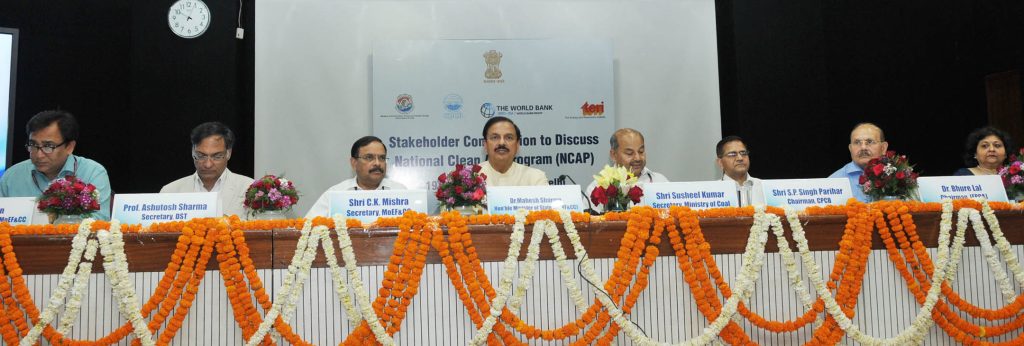Need to translate outcome of the deliberations on the ground: Dr. Mahesh Sharma
Need to translate outcome of the deliberations on the ground: Dr. Mahesh Sharma

NEW DELHI: Emphasizing the need to translate the outcome of the deliberations, in the form of suggestions on the ground, Minister of State for Environment, Forest and Climate Change, Dr. Mahesh Sharma has said that the National Clean Air Programme (NCAP) is expected to play a crucial role in addressing the increasing air pollution across the country in a comprehensive manner.nnInaugurating the two-day Stakeholder Consultation on NCAP here today, Dr. Sharma emphasised the impact of air pollution on health and general well-being of human, floral and faunal population.nnHe said that stakeholders are and must act as ?givers? to the society.nnSpeaking on the occasion, Secretary, Ministry of Environment, Forest and Climate Change, C.K Mishra said, ?While as a nation, we need to be concerned at the quality of air, as a Government we need to have that commitment to ensure that there is a defined time-frame that we may set for ourselves after today?s discussions?.nnHe added that all the states and stakeholders need to spread the campaign for clean air across the country. The Secretary pointed out that technology is one of the critical elements of NCAP.nn?Let us together find solutions that are nationally acceptable, but more importantly, which are locally possible?, Mishra stated.nnThe Stakeholder Consultation involves all the State Governments, considering that NCAP is a pan-India programme and inputs from states will be useful in evolving an effective implementation strategy.nnThe overall objective of the NCAP is comprehensive management plan for prevention, control and abatement of air pollution besides augmenting the air quality monitoring network across the country.nnThe NCAP focuses on collaborative and participatory approach covering all sources of pollution and coordination between relevant Central Ministries, State Governments, local bodies and other stakeholders.nnThe focus is on intensive awareness, training and capacity-building drive, with specific impetus on augmentation of manpower and infrastructure facilities of CPCB and SPCB under the capacity building component of NCAP. Separate components with emphasis on three tier mechanism for review of monitoring, assessment and inspection for effective implementation under NCAP. A credible, transparent and accountable data collection and monitoring system that is available for timely swift action is to be ensured.nnSince air pollution mitigation necessitates collaborative efforts, the success of NCAP is expected to be determined by the participation and contribution of stakeholders. Accordingly, there is a need for consultation with various stakeholders viz. state governments, relevant ministries, institutes, academic institutions and industries. The approved NCAP has already been shared with state governments and has also been uploaded on the Ministry?s website for inviting comments from the public.nnThe key components of NCAP include – city-specific air pollution abatement action plan for 100 polluting cities of the country similar to one for Delhi, increasing the number of monitoring stations, data dissemination, public participation on planning and implementation, setting up of Air Information Centre for data analysis, resource apportionment studies, setting up of national inventory, guidelines for indoor air pollution and setting up of rural monitoring stations.nnMoEF&CC has formalized the NCAP as a long-term time bound national level strategy to tackle the increasing air pollution problem across the country in a comprehensive manner. The total tentative cost of NCAP is estimated at Rs 637 crore.nnRepresentatives from World Bank and The Energy Resources Institute (TERI), Secretary, Ministry of Coal, Susheel Kumar, Secretary, DST, Prof Ashutosh Sharma, Additional Secretary, MoEF&CC, A.K Jain, Joint Secretary, MoEF&CC,Manju Pandey, Chairman, Central Pollution Control Board, S.P.S Parihar, Chairman, EPCA,Bhure Lal and other officers of the Ministry were present at the inaugural session of the Consultation. In addition, officials from State Governments, including officials from SPCBs also participated in the Consultation.





